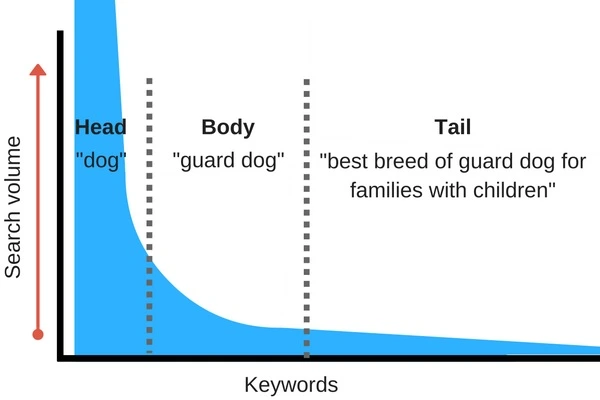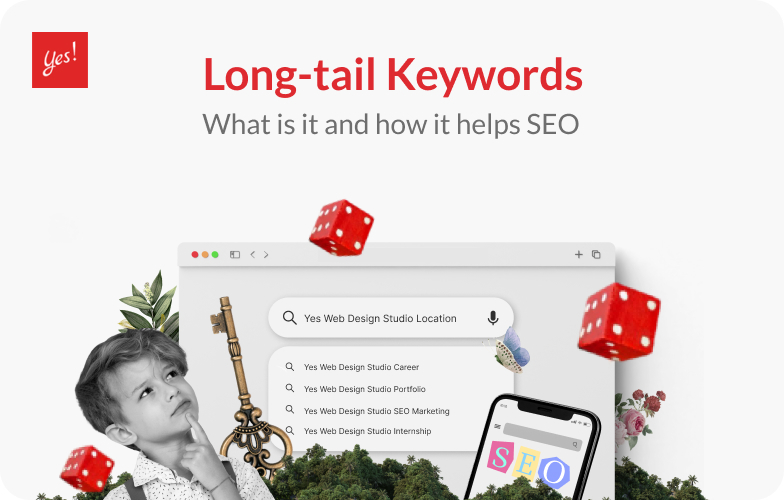There are various methods that site owners use to make their website placed on Search Result Pages, one of the recognised methods that has been popular over the years is keyword clustering. Keyword clustering is a SEO technique used to group words that have similarity to the page gearing to the search intent of users online. There are also types of keywords and one of them is Long-tail Keywords. It is the practice of using a usually long, specific, detailed phrase that has low volume in search that can result in higher conversion rate.

Although Long-tail Keywords contain low volumes, its specificity makes it easier for users to find when they search for something in particular that can result in your page ranking high on search results especially small companies that just started doing SEO blogs. Before going into detail of the benefits of utilizing Long-tail Keywords geared for SEO, let’s look at what its meaning and usage is.
Head & Long-tail Keywords, What is it?
Head Keywords is the main word that drives high search volume, for example SEO is a Head Keyword. It is known to be short and open meaning with high search volumes due to its generality, using words that are searched popularly. Long-tail Keywords on the other hand have low search volume due to uses of more words that explains the search intention in detail using specific words to find the exact item. This graph illustrates the difference between Head & Long-tail Keywords to give a clearer sense of how Long-tail Keywords works:
| Head Keywords | Long-tail Keywords |
| Leather Jacket | Vegan Leather Biker Jacket for Men |
| Water Bottle | Self Cleaning Glass Water Bottle |
| Coffee | Brazil Yellow Bourbon Coffee |
| Tattoo Ideas | Small Tattoo Ideas for Women Sleeves Black and White |
| Wooden Frames | Oak Wooden Frames For Canvas Prints |
| Headphones | Wireless Noise Canceling Headphones for Gaming |
Ideas Behind Long-tail Keywords
The idea behind long-tail keywords is that, instead of focusing solely on popular and highly competitive keywords (head keywords), businesses or content creators can target less frequently searched, more specific phrases that are highly relevant to their niche audience using Long-tail Keywords. These longer, more detailed keywords may have lower search volumes individually, but they can add up to a significant amount of traffic when combined together.
By targeting long-tail keywords, we can increase the chances of ranking higher in search engine results pages (SERPs) for these specific terms since there is less competition. This approach can also help attract more qualified traffic to a website, as users who search for longer, more specific phrases are often further along in the buying cycle and more likely to convert.
How to Find Long-tail Keywords
There are many tools that offer Long-tail Keywords and find the ones that suit best with your site. However, for starting you can use Google SERPs in ‘Related Search’. It is located at the bottom of the Google Search Results. For example if you search the word ‘leather jacket’, one of the suggestions that Google gives are ‘Leather Jacket Brown’ or ‘Leather Jacket Styles’. By looking at Google Related Search, it can give a sense of what people are searching for and site owners can continue their keyword clustering.
Less competition
Long-tail keywords typically have lower search volumes than broad, popular keywords due to its long and detailed phrases. However, with the specificity, there are fewer websites that will be competing to rank for these terms.
For instance, there are two coffee shops online that just started their own websites with the purpose of wanting to reach more customers. What they both decided to do is to write blogs for SEO. One shop decided to use head keywords with high search volumes only because they think that with many users searching, they will be able to make it to the top.
However, the other shop decided that they want to add more to the Head Keywords, adding additional information about their beans and its originality although they have low search volumes. In the end the second shop that uses Long-tail Keywords ends up receiving more customers than the first shop due to its specific words that customers use to search. The first shop didn’t make it to SERPs because there are other big coffee shops that have more SEO history and authority making it hard to compete.
Using Long-tail Keywords makes it easier for businesses and content creators to achieve higher rankings in SERPs for these specific keywords, increasing their visibility and attracting more traffic. With some industries that are very competitive in terms of rankings, it is very difficult for smaller companies to compete with some websites that have been creating their authorities, this is why Long-tail Keywords will give an edge to those companies who recently joined the SEO game.
Higher Conversion Rates
Long-tail keywords are often more specific and targeted which means that users who search are typically further along in the buying cycle and are more likely to convert into potential customers. For example, someone who searches for “best running shoes for women with flat feet” is likely to be closer to making a purchase than someone who simply searches for “running shoes.” By targeting long-tail keywords, businesses can attract more qualified traffic and increase their conversion rates. The more detailed the search, the more intention in buying the product.
Cost Effective
Long-tail keywords can be less expensive to target with paid advertising than broad, popular keywords. The reason is due to its low competition and low CPC rates. As a result, businesses can achieve a higher ROI by targeting long-tail keywords, as they are more likely to attract qualified traffic from niche audiences looking for something specific and generate conversions at a lower cost.
Conclusion
With all the benefits that have been said in this article, utilizing Long-tail Keywords will help small companies find an edge to compete with big companies with high authority in the SEO game. All in all, although the search volume is low with its specificity in the keywords, it is more likely that users who are searching in detail are looking to purchase than those who use general words.
Yes Web Design Studio
Tel. : 096-879-5445
LINE : @yeswebdesign
E-mail : info@yeswebdesignstudio.com
Facebook : Yes Web Design Studio I Web Design Company Bangkok
Instagram : yeswebdesign_bkk
Address : 17th Floor, Wittayakit Building, Phayathai Rd, Wang Mai, Pathum Wan, Bangkok 10330 (BTS SIAM STATION)









